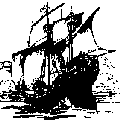37. Discovery of the New World
"Lord of the lordly sea, Earth's mightiest captain he. " —WATSON. The year 1492 was a proud year for Spain, when the last Moorish stronghold had fallen and Christopher Columbus had started on his great voyage of discovery.
He had had difficulties in making the preparations for his start. The Spanish sailors looked on the expedition with horror, and the commander as a madman. It was early on the morning of August 3 that the little fleet of three ships sailed forth from a southern Spanish port. A more unwilling crew never left land. As the last speck of Spain vanished from their backward gaze, and only the wide waters of the Atlantic stretched before them, the men burst into tears as they thought of the home and friends they never expected to see again.
Ten days' sail brought them to the Canary Islands. And now, instead of turning south, as the Portuguese sailors were doing, Columbus steered to the west, a direction in which no man had steered before.
As day after day, week after week, passed by, bringing no sight of land, but only a wide expanse of waters, the crew grew more and more discontented. They complained and murmured against their admiral, until they nearly broke into open mutiny.
"We are in seas where never yet man ventured before," they said among themselves; "are we to sail till we perish? " Surely it would be wiser to throw the admiral into his unknown sea and turn the ships for home. And Columbus? He knew all this: but he set his face resolutely forward, he never wavered from his course, his faith in his great plan never left him. He tried to stir his men to interest themselves in the strange land to which he was guiding them, and offered a large reward to the man who should first see land.
So they sailed on, till at last it became evident that land was not very far off. Birds came singing about the ships, weeds were seen floating in the water, and a branch of thorn with red berries was borne past them. All became eager enough now.
It was the evening of October 7—two months since they had left home. When the crews collected as usual to sing their evening hymn, Columbus spoke to them. Land was very near now, he said; God had been good to bring them in safety thus far; let every man watch, for their reward was at hand.
Not an eye closed that night. As darkness came on Columbus took his watch on the highest place in the ship, while his eye searched again and again the dusky horizon. About ten o'clock he saw a glimmering light far away. Every eye was fixed on it, till at two o'clock in the early morning a gun, fired from one of the other ships, proved him right. Land had been seen. Eagerly, impatiently, they awaited daylight.
When the sun rose on the morning of the 8th there stretched before the earnest eyes of the resolute commander a beautiful island, green, cool, and well wooded.
They had reached the Bahama Islands, off the coast of America; but Columbus thought they were off the coast of Asia, never realising that a whole country stretched between him and Asia.
Taking the royal standard of Spain, and throwing a crimson cloak over his coat of mail, he rowed to shore. As he stepped on to the newly found land, he threw himself on to his knees, kissed the strange new earth, and praised God with tears of joy. Then rising, he drew his sword, and took possession of the island in the name of Ferdinand and Isabella of Spain.
The men now thronged round him, kissing his hands, begging forgiveness, assuring him of their unbounded trust in him.
And Columbus? He had accomplished the work of his life. The thoughts and plans and dreams of a lifetime had been crowned with success. He had discovered a new world of vast importance. This much he knew and no more.
Natives now came up to the Spaniards. They had gazed for some time at the shining armour, the swarthy skins, long beards, and splendid dress of these strangers to their shores. Now, by signs, they told the Spaniards of more land to the south and west. So away sailed Columbus, finding another island, now called Cuba, just off the coast of Florida, in North America.
It was all so beautiful here. Birds of brilliant colours never ceased to sing, clear streams and rivers flowed to the sea. There were stately forests, sweet-smelling flowers, all under a deep blue sky.
From island to island they cruised, discovering many things of which no man had dreamt before. In Cuba they discovered tobacco and potatoes, two products hitherto unknown in Europe.
But now Columbus wanted to get back to Spain to tell his wondrous news. On the way home a terrible storm burst over the Atlantic, and it seemed for a time as if the little Spanish ships must perish with all on board. But they triumphantly weathered the gales, and sailed into the Spanish harbour of Palos just seven months after their departure.

